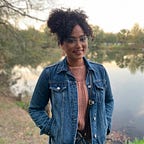We Wake to This
There’s a scene in “I Am Not Your Negro” where a 1950s housewife is twirling about in her kitchen, doing basic June Cleaver-esque things. In the background you hear a reading of James Baldwin’s that talks about the grotesque violence of it all.
I keep replaying that scene in my head. The contrast of the supposed innocuousness of it with the undergirding truth that the construct of whiteness only ever had one end — to divide so as to eliminate all opposition. To be right so all others would be wrong. To be light so every other view would be cast as darkness. To be clean and, in pervading, wash all others away.
This morning, Aaron Dean woke up in the mantle of his whiteness. I can only assume that he took a piss, washed his face, brushed his teeth, having opened his eyes to a world that has always belonged to him.
This morning, James Smith woke with the ache of guilt and shame knowing his act of kindness in trying to be a good neighbor resulted in more pain and suffering than he would wish on his worst enemy, fraught with the fear that the powers that be actually cannot be trusted.
The family of Atatiana Jefferson woke up with pain too deep for words. An 8-year-old child will likely be shaped by the trauma of watching his beloved aunt die trying to protect him from suspicious lurkers behind their home. Siblings will convene every holiday, sensing the absence at the table. An ailing mother has to bury the very daughter that came home to take care of her. The world is deprived of another great mind and heart that built a whole career and life around caring for the hurting.
And Atatiana, she did not wake up at all. She and her potential and her dreams are gone forever, and no amount of “justice” brings her back. Justice doesn’t result in a day where she smiles proudly at her parents during a white coat ceremony. Justice doesn’t mean she gets to watch her nephew graduate or that she gets to be the cool aunt he tells everything to. Justice doesn’t mean that she gets to find a romantic partner, say I do and have a father-daughter dance. Justice doesn’t mean her family and friends get back their confidant, advice giver, inside joke pal, or any of the other things we get to be for each other in this life. She will not be returned to them after the sentencing. She will not be set free to live the life all accounts say was abundant.
I didn’t know Atatiana but this loss hurts. It hurts and it scares me.
She and I are the same age, and similar to her, I recently moved home to be closer to family. Similar to her I’ve seen my mom really sick. Similar to her, I have roots in Louisiana and Texas and at Xavier University. Similar to her, I watch my little nephew as often as my sister needs — taking my role as family and the flexibility of singleness and childlessness seriously.
I was watching my nephew when I first read about Atatiana. He was down for a nap when I combed through the articles and reports, feeling a bit of myself go deeper underwater with each line of the story. I cried.
I cried for her. But I also cried for me and for my family and my community. I cried knowing that I could be taken with little to no consequence, and that would leave a gap in the lives of people I love. I cried knowing that I live in a world that wants my end more than it wants to be whole.
This weekend I visited family in upstate New York. We missed our exit and wound up driving through winding country roads in the hills of Pennsylvania at night. It went without saying but we said it anyways — we felt unsafe. Worst case scenarios flashed through our minds again and again, and I felt my heart rate spike. I thought about that feeling and how normal it has become for me — fear. Fear of retaliation against my body for daring to be woman and Black. Fear that I would see those I love dear harmed by those in power. Fear.
And then I realized there are people who have never felt this fear. People who twirl around in their June Cleaver aprons feeling safe. There are people who drive down country roads at night without panic attacks, confident they can ask a police officer for assistance if they lose their way. There are people who kill Black bodies without consequence, posting bail and waking up in their own beds in no time at all.
And then there are people who are complicit. Standing by — believing themselves neither victim nor villain — but spectator. They haven’t seen enough.
